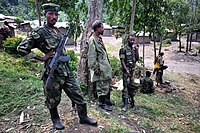March 23 Movement
| March 23 Movement Mouvement du 23-Mars (French) |
|
|---|---|
 |
|
| Leader(s) |
Bertrand Bisimwa (president) Sultani Makenga (military chief) Jean-Marie Runiga Lugerero (former president) |
| Dates of operation | April 4, 2012–November 7, 2013 |
| Active region(s) | Democratic Republic of the Congo, primarily North Kivu |
| Notable attacks | M23 rebellion |
| Status | Active, allegedly supported by Uganda and Rwanda |
| Size | At least 5,500 |
The March 23 Movement (French: Mouvement du 23-Mars), often abbreviated as M23 and also known as the Congolese Revolutionary Army, was a rebel military group based in eastern areas of the Democratic Republic of the Congo (DRC), mainly operating in the province of North Kivu. The 2012 M23 rebellion against the DRC government led to the displacement of large numbers of people. On 20 November 2012, M23 took control of Goma, a provincial capital with a population of one million people, but was requested to evacuate it by the International Conference on the Great Lakes Region because the DRC government had finally agreed to negotiate with them. In late 2013 Congolese troops, along with UN troops, retook control of Goma and M23 announced a ceasefire, saying it wanted to resume peace talks.
On March 23rd 2009, the National Congress for the Defence of the People (CNDP) signed a peace treaty with the DRC government, where it became a political party, and the M23 soldiers integrated into the Armed Forces of the Democratic Republic of the Congo (FARDC). M23 takes its name from the date of these peace accords (March 23). The armed wing of the group is led by General Makenga Sultani, who has served as acting president of the group since the 28 February 2013 removal of Bishop Jean-Marie Runiga Lugerero, a former CNDP member.
The M23 was formed on 4 April 2012 when nearly 300 soldiers - the majority of them were former members of the National Congress for the Defence of the People (CNDP) - turned against the DRC government, citing poor conditions in the army and the government's unwillingness to implement the 23 March 2009 peace deal. General Bosco Ntaganda, also known as "The Terminator", was accused by the Government of Kinshasa of leading the group, and President Kabila called for his arrest on 11 April 2012. The government had threatened to redeploy former CNDP soldiers away from North Kivu before the full implementation of the peace agreement, which prompted many of them to defect from the army and create the M23.
...
Wikipedia
